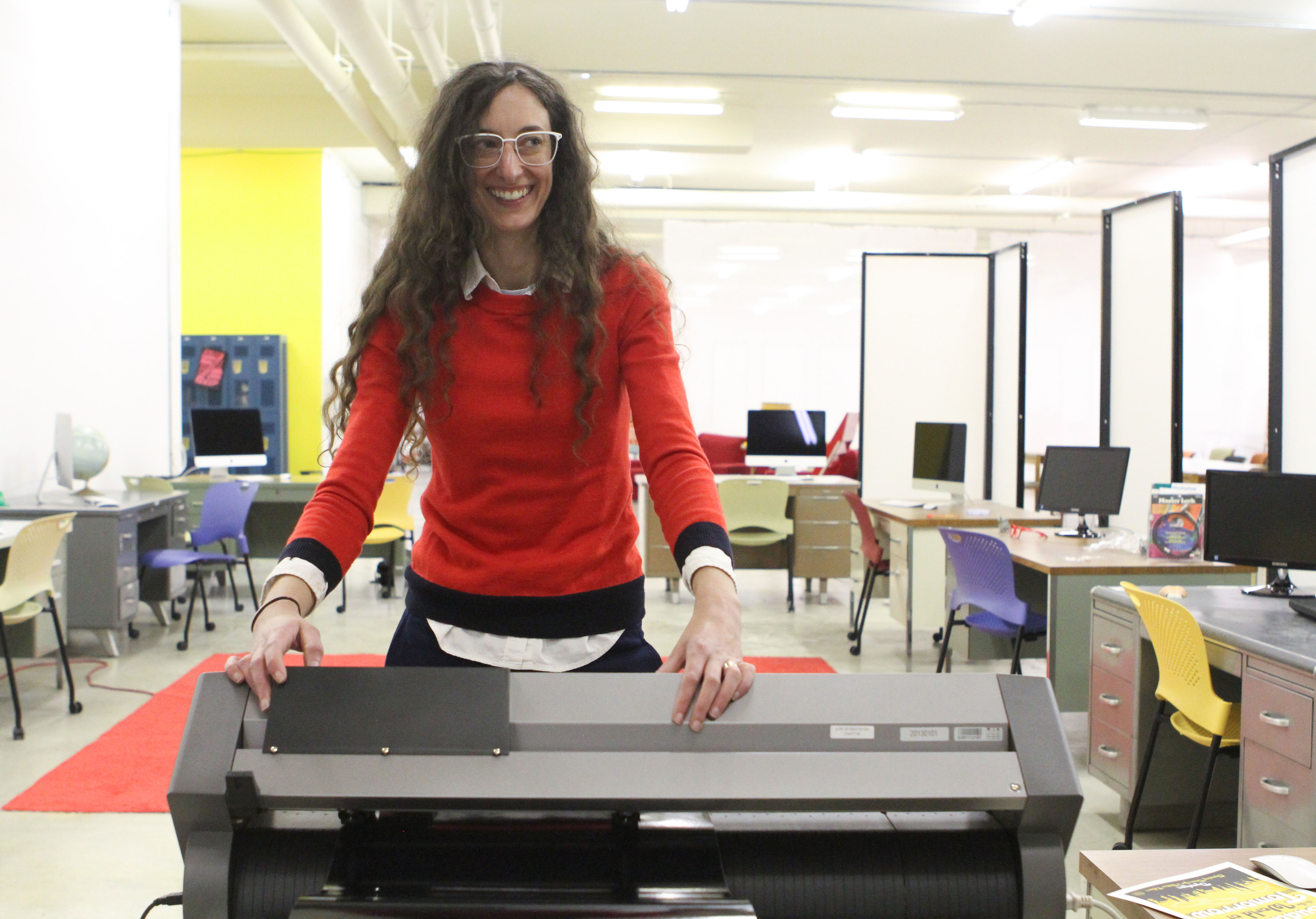MEG BACKUS
Backus came to the Public Library in 2012 after a stint at the Onondaga Public Library in Cicero, N.Y., where she was a part of the LibraryFarm, a community garden where patrons can "check out" plots.
She likes libraries because they provide a "cultural commons" for communities. And far from the idea of stodgy, rule-bound librarians, she has viewed her work at the 4th Floor of the library - which she calls a "beta space, a hacker space, a maker space" - as a place to play and experiment, crowd-sourcing ideas for projects and seeing what sticks.
"Someone came in and said they wanted to learn how to sew," she says. "We said, 'How can we make this happen?' and now we have a sewing machine that people can use. That's kind of how it works."
At a recent Arduino Hack Night - a workshop where attendees play with miniature computers called microcontrollers - Backus showed a group how to rig up the system to identify different types of foods. Why build a rudimentary computing system that can tell spaghetti from a sandwich? The answer is a solid "just because."
"I love the weird stuff, I love the stuff that there will never be a market for but someone wants," she says.
Why are libraries important?
Libraries are important because society and culture are collectively-produced phenomena; we are not the audience of these phenomena but their makers. Inclusive opportunities to explore, examine, engage, and try to improve ourselves and our world are important features of a just society, and libraries are committed to serving these needs and understanding barriers that might exist in their communities.
Did you always think you might like to be a librarian? Do you have fond memories of libraries as a kid?
No, I did not come to librarianship by habit of thought, and aside from being enamored with those plastic bag hangers containing book+cassette, the library is not an especially memorable part of my childhood. Libraries suggested themselves to me for the values they represent. I was reading a lot of theory about systems of power and control, freedom, property, ownership, culture, and needed to do practical work related to these ideas. Libraries value democratic ideals of distributing power and culture but I thought they could be doing so much more, so I went to library school.
Tell me about the 4th Floor project at the library - what is the fourth floor? What does it provide?
Whereas libraries have traditionally been focused on access to materials for consumption (reading, watching, listening), the 4th Floor is a space that provides access to tools to facilitate content creation. It's our response to the growing importance and complexity of participatory culture. Think about how the Internet moved from read only to read/write. The 4th Floor is the locus of that same transition in the physical library. It's a place that appreciates the immense amount of learning and opportunity encased in Do-It-Yourself projects and peer-to-peer sharing.
Talk about the 3D printer - what's it all about, and what does it mean that it exists? Why does the library have one or need one?
3D printers are desktop devices that allow a digital design to become a physical object. They democratize manufacturing the way the Internet democratized information. 3D printing stands to represent another component of the digital divide, something libraries work hard to diminish, but this digital divide crosses into a physical, material divide. At this early stage in the development of the consumer 3D printer, we want the technology to get into as many peoples' hands as possible. This tool has a learning curve but it is manageable, and people who do not identify as technologists deserve to know how powerful and learnable this tool is.
How has the internet changed reading, literacy, and the sharing of information?
The Internet has changed everything. The biggest takeaway for me has been that regular people (that is, people without book deals or other traditional publication avenues available to them) make the most amazing things--they can be careful readers and talented writers and imaginative content creators and curators. The energy behind sharing on the web has created new ways to talk about literacy: we now have a concept of digital literacy, information literacy, transliteracy.
You're originally from Michigan and before this you worked in upstate New York. What differences do you see between those places and Chattanooga? Why Chattanooga?
I'm in Chattanooga because I want to make the public library that should exist, the library worthy of what the public deserves. The biggest difference in Chattanooga is that I'm surrounded by other people who are equally dedicated to a imilar challenge. The whole city--every level and sector--seems sincerely committed to improving the quality of life in Chattanooga, and eager to support each others' ideas and efforts. That seems rare and special.
How do you want to change Chattanooga? What's your ultimate vision for the library?
I hope for the library to be a space that raises visitors' curiosity quotients and gives them confidence that they have everything they need to make all the learning they've always wanted to do possible. I want to see collaborative projects among people of different ages and backgrounds, bringing their own visions for their city into being.
Favorite book and favorite website.
Favorite book is The Brothers Karamazov, although my favorite author is George Saunders. Favorite website is Sociological Images. http://thesocietypages.org/socimages/
Favorite place to read in Chattanooga?
I've become someone who uses audiobooks a lot, which I listen to while walking my dog, so the walking bridge and some of those paths and parks by the river are my favorite. There are people but no background music and no cars, which make them the best places.

